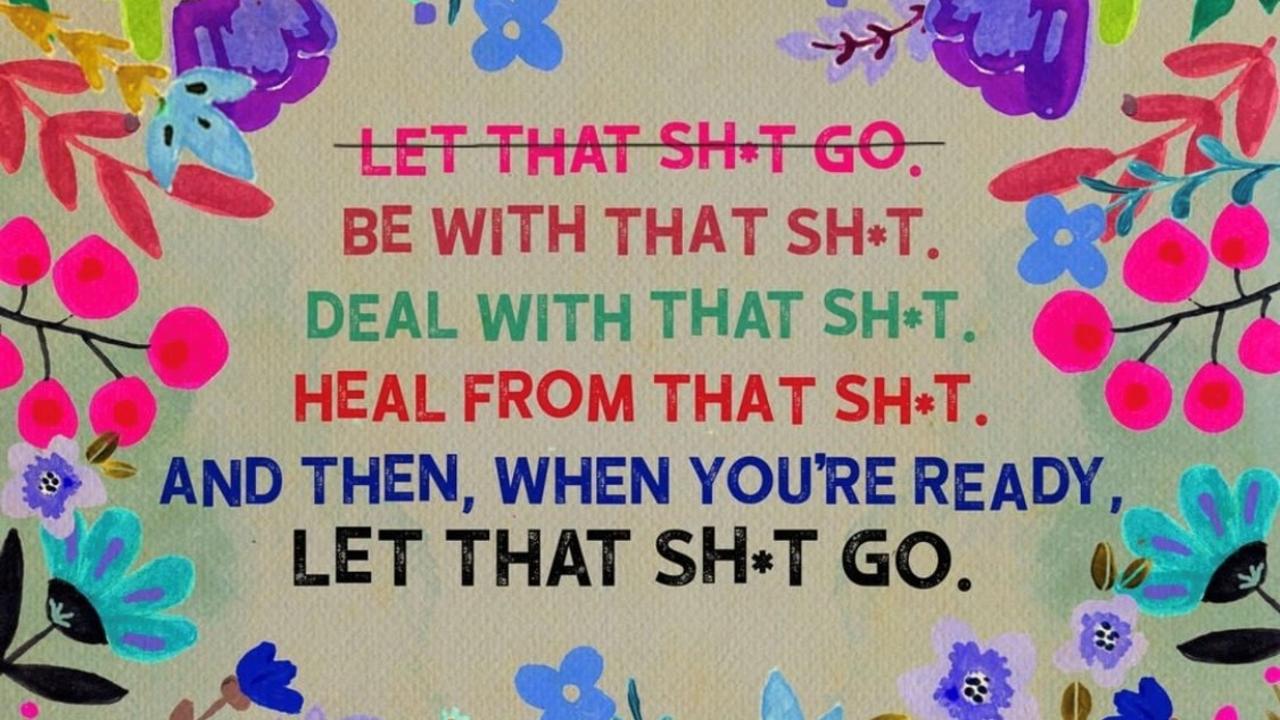This Separates Great Leaders form the Rest

The emotional intelligence skill of self-management is a talent that separates great leaders from the average ones. As humans we have the ability to observe ourselves from a third party perspective - like a fly on the wall. It’s the greatest skill for creating peace and building executive presence.
In that moment when you’ve been triggered to feel uncomfortable and could act on it by lashing out, withdrawing or ruminating about it you have a choice. The discomfort is so great that we just want to get away from it. This externalizes a hurt that never heals. It’s like carrying around a bag that is too heavy. And it shows in behavior.
In the trigger instant turn inward with compassion to yourself - not outward in fear. Choose to be your own big brother. A deep breath clears the space to say, “May I be gentle with myself in this moment.”
Be as sweet to yourself as you would be to a hurting child or puppy. You deserve that.
Wishing...
They Don't Think the Way You Do
I learned this lesson as a new manager. I used to think if everyone worked like I did there’d be no problems at work. How wrong I was.
I learned along the way that my direct reports aren’t in my head. They don’t know my motivation either. When I started to ask more for their opinions and give them more information on my thought processes and strategies - the “Why?” behind what we were doing they felt more included and part of the process.
People are inspired by different motivations. They work, play and think differently. Our job as leaders is not to tell them what to do and expect them to do it our way. It is to role model excellence, support them, get out of their way and hold them accountable.
If you fear age bias or sense that you are too old to compete in the workplace here is the link to a free plan to help differentiate your value proposition. You are NOT too old. You just need to position your value proposition. Learn how with...
They Don't Think the Way You Do

I learned this lesson as a new manager. I used to think if everyone worked like I did there’d be no problems at work. How wrong I was.
I learned along the way that my direct reports aren’t in my head. They don’t know my motivation either. When I started to ask more for their opinions and give them more information on my thought processes and strategies - the “Why?” behind what we were doing they felt more included and part of the process.
People are inspired by different motivations. They work, play and think differently. Our job as leaders is not to tell them what to do and expect them to do it our way. It is to role model excellence, support them, get out of their way and hold them accountable.
If you fear age bias or sense that you are too old to compete in the workplace here is the link to a free plan to help differentiate your value proposition. You are NOT too old. You just need to position your value proposition. Learn how with...
This Matters for You Executive Presence

I really like the line, “Are you operating as an emotion scientist or a judge.” Emotion scientists observe their and other people’s emotions from a third party perspective and get curious about what’s behind them. Judges judge to get away from the discomfort of feeling uncomfortable.
Scientists process and name the emotion to release it. Judges turn and run from it with it nipping at their heels forever. Scientists have executive presence. Judges get stereotyped as difficult, emotional and ineffective.
There’s always a choice. One is harder and requires looking inward with humility and curiosity. One is easier and demands externalization with blame that results in underlying shame.
Practice being the scientist. It makes life and leadership far easier in the long run.
If you want to create your career by design here is a link to my FREE Career and Life Planning Tool. If you don't know where you'll be at the end of the year you are...
The Seven Deadly Sins of Management

Years ago I read a book called the Seven Deadly Sins and agreed that the first among them was the most deadly - Pride. The greater our ego, the greater our pride, the lesser our humility and the greater propensity we have for failure. The people you have the most difficulty with have far greater difficulty with their own egos, need to be heard, desire to be recognized and rush for validation. Don't let that person be you.
The Seven Deadly Sins of Management
- Pride that you are more capable than your employees. How gratifying is it to be dubbed ‘King Know-It-All’ when everybody hates your guts? When you make all the decisions and give continual directives it cuts off their ingenuity, independence and desire to take risk.
- Sloth in your dedication to develop your team. You develop projects but how often do you develop talent? When is the last time you asked an employee, ‘Where do you see yourself a year from now? What project would...
Three Steps When You're Afraid

This week I had to give a presentation at work not unlike others I’ve given throughout my career, yet I was nervous. Every time I thought about it my heart started to race and I got tense in my neck and shoulders. Public speaking is one of the leading causes for workplace fear. But I speak often so my nervousness didn’t make sense. As an executive coach I know not to turn away from fear but to bring it closer like you would a hurting child. That self-nurturing was hard in this instance. But I kept getting curious about what I was really afraid of.
When I could stand open and vulnerable without judging myself, I realized I had a lot of personal distractions this week that made me feel anxious and irritable. Just the day before I had argued with an online bank customer service representative who refused to cancel a credit card they had sent to my home for my deceased father. I kept trying to convince him that this was the bank’s problem and should not be my...
What to do with Entitled Employees

I’ve never understood why overbearing people think they have power. It’s obvious they don’t. Nobody trusts them or authentically has their back. They are always exhausted trying to make themselves look good at other’s expense. Their insecurities reek in their behavior. And their leadership has no sustainable affect because the people they play to are the first ones off the ship when it starts to go down.
If you can’t achieve your goals without manipulating, controlling, condescending to, backstabbing, and intimidating other people along the way you’re weak and you will ultimately fail. Period. I’ve seen it in corporate America time and time again. It may not be right away. But it will happen. And your legacy will precede you everywhere you go after that.
The real problem with mean people is that they are intrinsically unhappy, insecure and have minimal self-awareness. The root feeling behind their behavior is anger coupled...
9 Questions to Ask Yourself When You Can’t Move On

After a difficult transition such as a job loss, broken relationship, forced relocation, lost promotion, loss of a loved one where you’ve been left feeling less than yourself, depleted and ineffective well-meaning people who care about you often tell you to just ‘move on.’ As if you don’t already want to move on you take this advice in stride and wish you could do exactly what they suggest. When you can’t, you feel even more flawed. At worst, you act out your frustration, stripping your executive presence.
Most people know when they need to move on. Nobody wants to wallow in prolonged anger, sadness, fear, frustration or despair such that these feelings get in the way of joy and rob you of living in the moment. But HOW do you do that? Instinctively you want to turn away from suffering. Unfortunately, that only makes it worse. We must get curious about it. We need to familiarize ourselves with its motivation and dissect it so that we can understand...
The Grass Is Greenest Here

It’s wise to observe ourselves just as we observe others. This is how we build self-awareness and executive presence. But when we insert judgment into the equation the sum ends up in the red. Judgment negates everything we work for. Many of my clients start out riddled with self-doubt and an inner critic that is difficult to harness. If that is you, observe the feeling and tell yourself, “Oh, that’s just me doubting myself,” as opposed to judging yourself for feeling that way. We can let go of that which we own. That which we turn away from chases us down forever.
Observe for the purpose of gathering information.
Observe as if you are watching yourself or another on TV.
Observe for the sheer purpose of allowing the truth of the situation to be evident without any editorial judgment.
Someone or something may be upsetting you. Don’t attach an assumption to it or a story that is biased.
Water the grass where you are...
5 Executive Presence Calming Strategies for the Moment You're Confronted

Your day is going well. You’ve done your research and are a maven on your project. You’re in a meeting and out of nowhere someone blindsides you with cynical inuendo, overt criticism, passive aggressive posturing or their personal agenda. Your body gets stiff. Your face feels flushed. Your heart is racing. A voice inside your head is screaming, ‘Danger!’ And then in your own defense you do or say something you later regret.
We’ve all been there.
Some people can weather these situations without losing their presence. Others cannot. The difference is that some people have trained themselves to be able to notice what is happening to them, both emotionally and physiologically, lean into it with curiosity as opposed to away in fear, and allow the immediate physiological and emotional response to subside so they can respond appropriately.
Initially, you may think you don’t have time for this transition to take place before you need to react. Like most...
